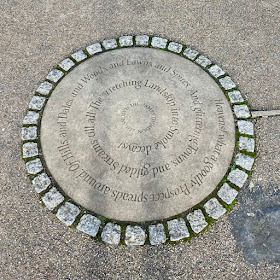Clare read as much of the poem as he could before giving it back to its owner. The book was falling apart and most of Winter had gone missing. He was amazed that a work of such beauty could have been handled so carelessly. But the weaver only laughed at him and said that "t'was reckoned nothing of by himself or his friends" ...
The very next Sunday, he walked to Stamford. The bookshop was shut. He contrived a plan to return on a weekday when it would be open. His job that week was tending horses, so he paid one of the other boys a penny to mind his and another penny to keep the secret. As soon as the horses had been taken outdoors, he headed off. He arrived in Stamford so early that the town was almost deserted. At last, though, the bookseller opened his doors. A copy of The Seasons was Clare's for the bargain price of a shilling (the weaver had paid half as much again for his).
The sun was now up and it was a beautiful morning. He couldn't wait to delve into his book, but didn't want to be seen reading in public on a working day, so he climbed over the high wall that ran beside the road home. This took him into Burghley Park. He nestled on a lawn beside the wall: 'and what with reading the book, and beholding the beauties of artful nature in the park, I got into a strain of descriptive rhyming on my journey home.'
It was on this walk that Clare composed the first poem he ever wrote down, 'The Morning Walk'. He kept going, writing in secret and used a hole in a wall to store his manuscripts. He borrowed books and tried to teach himself grammar but decided it was better to try to write as he spoke. Later he would say that his chief inspirations had been The Seasons and Paradise Lost, although he drew too on the nature writing in William Cowper's The Task and Izaak Walton's The Compleat Angler. He also read the self-educated labourer-poet Robert Bloomfield, whose last volume Wild Flowers, or Pastoral and Local Poetry appeared in 1805. Bate notes that each of Bloomfield's books 'was less successful than the last, and he died in poverty in 1823. By that time, Clare's own poetic career was well under way.'
John Clare in 1820, by William Hilton


No comments:
Post a Comment
Comments are moderated because even with these filters spam is more common than non-spam. Your comment therefore won't appear immediately. Sorry for the inconvenience - genuine comments are really welcome.